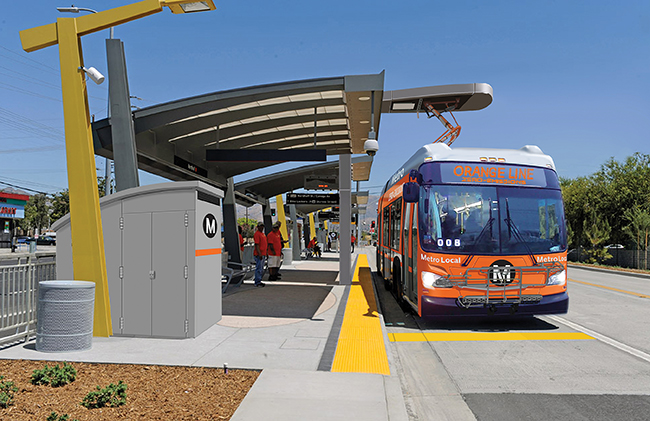
Battery-electric buses are gaining fast ground in traditional transit fleets. A key success factor in deploying electric propulsion lies within the deployment of the charging infrastructure.
Charging infrastructure can vary significantly in type. This includes the power type (AC – alternating current, or DC – direct current) and the power transfer type (conductive, using a plug or connector, or inductive, based on wireless transmission). Whatever charging infrastructure is pursued, successful public investment must focus on interoperability.
What is interoperability? Regardless of the bus manufacturer, and regardless of the charging equipment supplier, electric buses of all makes should be capable of charging with equipment available from multiple equipment suppliers. Charging infrastructure also needs to operate as simply, effectively, and as safely as a fuel nozzle for a diesel or compressed natural gas (CNG) bus.
Interoperability achieves four important objectives:
1. It reduces the likelihood of charging equipment becoming obsolete, leaving transit agencies with stranded assets (assets with premature write-downs or devaluations),
2. It requires less upfront and ongoing cost, by using a collaborative approach for developing enhancements to ensure forward and backward compatibility,
3. It simplifies operations in terms of preventative maintenance, service, and parts, and
4. It supports intelligent smart charging systems designed to reduce energy costs.
As the only manufacturer of all four heavy-duty electric bus propulsions (battery-electric, fuel cell-electric, trolley-electric, and diesel-electric), New Flyer anticipates a future filled with electric propulsion as the bus of choice. As such, joining and supporting charging standards committees and organizations is a key priority.
New Flyer does not design or manufacture charging equipment; that is not the company’s business model or an approach used by recognized electric vehicle manufacturers. Instead, New Flyer promotes interoperable charging, supported by key stakeholders including other bus OEMs, transit agencies, the Federal Transit Administration, charging equipment manufacturers (including Siemens, ABB, and ChargePoint), the American Public Transportation Association, the Society of Automotive Engineers, and non-profit organizations including the Center for Transportation and the Environment and CALSTART.
New Flyer’s preference for interoperable charging solutions includes charging for both long-range and short-range buses.
Long-range buses utilize plug-in charging and typically charge overnight. New Flyer uses direct current systems based on SAE J1772 and SAE J3068. SAE J1772 connectors are widely used by electric car manufacturers. DC charging, as opposed to AC charging, completes the power conversion for the batteries off the vehicle, in protective cabinets. DC charging requires fewer components on the bus for enhanced reliability. DC charging has also attained wide adoption as the ubiquitous public charging system of choice. These systems can be shared between cars, buses, and trucks.
OppCharge is an on-route rapid charging standard used for short-range buses, and is currently in service throughout many European countries. The system is under high consideration for inclusion in the forthcoming SAE J3105 standard. OppCharge established a common interface for charging electrical vehicles with interoperability as the key objective. The system uses an overhead pantograph to transfer power to the bus, based on technology developed for train, light rail, and trolley-bus applications. OppCharge is currently available from leading charging equipment suppliers such as Siemens and ABB, is Buy America compliant, and is also UL Certified. Further, New Flyer OppCharge compliant are already underway or planned in the U.S., including the cities of New York, Los Angeles, Portland, Salt Lake City and Minneapolis.
New Flyer chooses technology that is capable of ensuring charging equipment purchased using public funds can achieve a high return on investment. Non-proprietary and interoperable charging systems available from multiple suppliers will be a key success factor in the adoption of electric transit buses. With interoperability, everyone wins.
For more information on OppCharge, visit oppcharge.org.
David Warren is director of sustainable transportation for New Flyer. Lindy Norris serves as director of marketing communications, also for New Flyer. Visit www.newflyer.com for more information.
